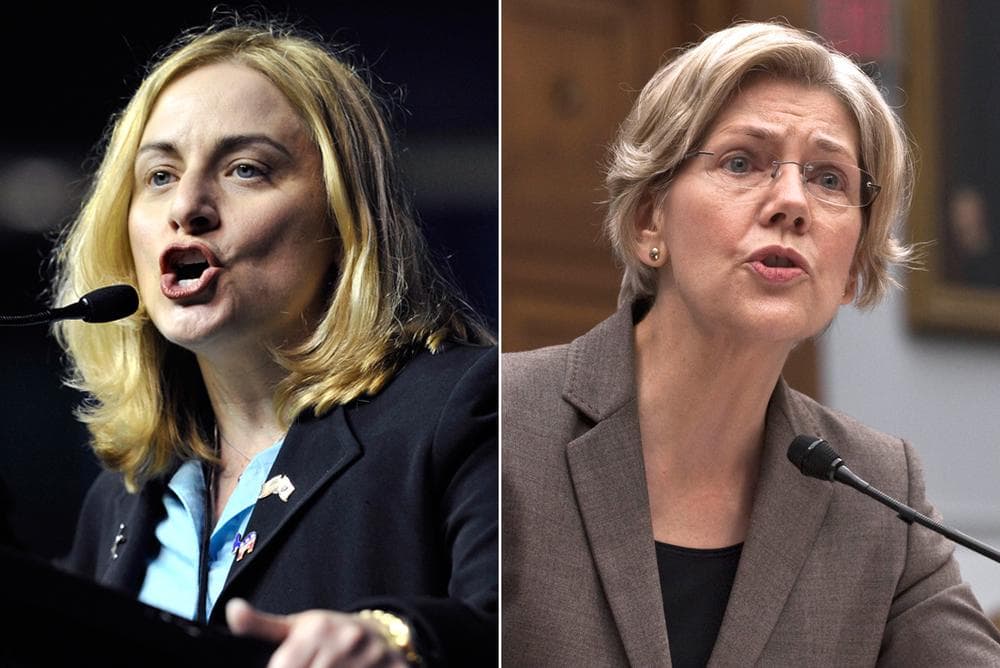Advertisement
PAYNE & DOMKE
Mass. Dems Could Determine Who Controls The U.S. Senate

On Saturday, Massachusetts Democrats have a chance to advance their best hope to capture a senate seat and quite possibly the senate itself. They can remove a marginal competitor who has absolutely no chance to win. While I’m no fan of the state convention — it’s a waste of time and money — delegates should play by the rules. Specifically, they should utilize the 15 percent rule to end the candidacy of someone who can only gum up the works and make life easier for Sen. Scott Brown.
The Kindness Of Strangers
Marisa DeFranco, an immigration lawyer who once ran for city council in Peabody and lost, is counting on the kindness of strangers to get 15 percent of the 3,000 delegates eligible on Saturday; this requirement is a matter of state law and has survived high court challenges. To keep her off the ballot, supporters of Elizabeth Warren need to get 86 percent of the delegates — a tall order. It’s not like this was sprung on DeFranco; the rule has been in place for 30 years*.
People with much better chances — and more political wisdom and experience — dropped out months ago; Setti Warren, Bob Massie, Alan Khazei and Tom Conroy all saw no path to victory and withdrew in the interest of beating Brown.
Unreal Expectations
DeFranco, while a Democrat, is actually a member of the Permanently Aggrieved Party. These unrealistic dreamers reject political reality, occupy time and space, demand debates, lust for TV exposure, glory in their underdogness and deny they don’t have a snowball’s chance. Meanwhile, DeFranco’s has raised just $40,000 — about what Brown picks up on a good fundraising day with Wall Street bankers.
No Good For Warren
Some have said a primary would be good for Elizabeth Warren.
Let's consider the “benefits” of a primary:
- A chance to have to explain yourself yet again on your Native American ancestry, a subject DeFranco has picked up.
- A chance to get attacked by an opponent bent on getting publicity at your expense.
- A chance to spend campaign money early that could be used to defeat Scott Brown.
- A chance to be accused of ducking debates, when such encounters would not benefit you at all
- A chance to “sharpen” your message — which is like saying the Celtics should be grateful to the Sixers for taking them to 7 games so they would be sharper against the Miami Heat.
If skills need to be sharpened, the forces behind Warren should go all out to win 86 percent of the vote. In fact, the convention will be the first test of the Warren campaign’s much-discussed ground game strength.
The PR downside of knocking DeFranco off the ballot will be small and short-lived. Voters don’t care about party politics and who’s running and who’s not. Because she’s a major league griper, a defeated DeFranco would get several days of publicity, but that’s all.
Real Politick
The 15 percent threshold was created after conservative Democrat Ed King won the governorship in 1978 in a stunning upset of liberal reformer Michael Dukakis. By 1982, it became clear that to beat King, Dukakis would need a one-on-one contest in the primary. Dukakis forces organized for the convention and passed the 15 percent rule to keep a third candidate, Lt. Gov. Thomas P. O’Neill III, from splitting the anti-King vote. O’Neill comes from a family of accomplished head counters so before the convention, he dropped out. In the “rematch,” Dukakis defeated King in the primary then won back the governor’s office and all was right in the world.
Today, Dukakis says, in the interest of running the strongest race, “Warren has to focus intensely and exclusively on November,” he told the Boston Globe. A primary fight, he said, would give Brown a free ride through the summer months.
Since the rule was adopted, one candidate, Jack Flood, a very conservative state representative running for governor, failed to get 15 percent in 1990. Months later, he came out as a Republican, vindicating the party’s judgment. Fred Langone failed to get 15 percent for Lt. Governor in 1982, challenged the law, and lost his case all the way to the U.S. Supreme Court. Many others, such as Tim Cahill — who ran as an independent for governor in 2010 — may have been dissuaded by the rule.
Speak No Evil
State party spokespersons dutifully predict that DeFranco will get the delegate votes to qualify for the September ballot. Of course they said that. What did you expect them to say, that she’s in big trouble and we’re fixing to knock her off?
Delegates have the right to expect the candidates to be more than articulate or the farthest to the left; both should be able to make the case that they have a reasonable chance to beat Scott Brown, not just score points in the Boston Herald.
High Stakes
The vast majority of state convention delegates are fair-minded liberal activists who might agree with DeFranco on one or more issues. But this is about beating Scott Brown — with whom Warren is tied in recent polls — not rewarding a passionate advocate for minorities. With the balance of power in the senate a matter of perhaps two or three seats, Massachusetts could decide if the U.S. Senate is controlled by Democrats or Republicans.
Democratic delegates, Saturday is your chance; do the right thing.
Correction: An earlier version of this post incorrectly stated that the 15 percent rule has been around for 40 years; it has been around for 30 years.
This program aired on May 31, 2012. The audio for this program is not available.
